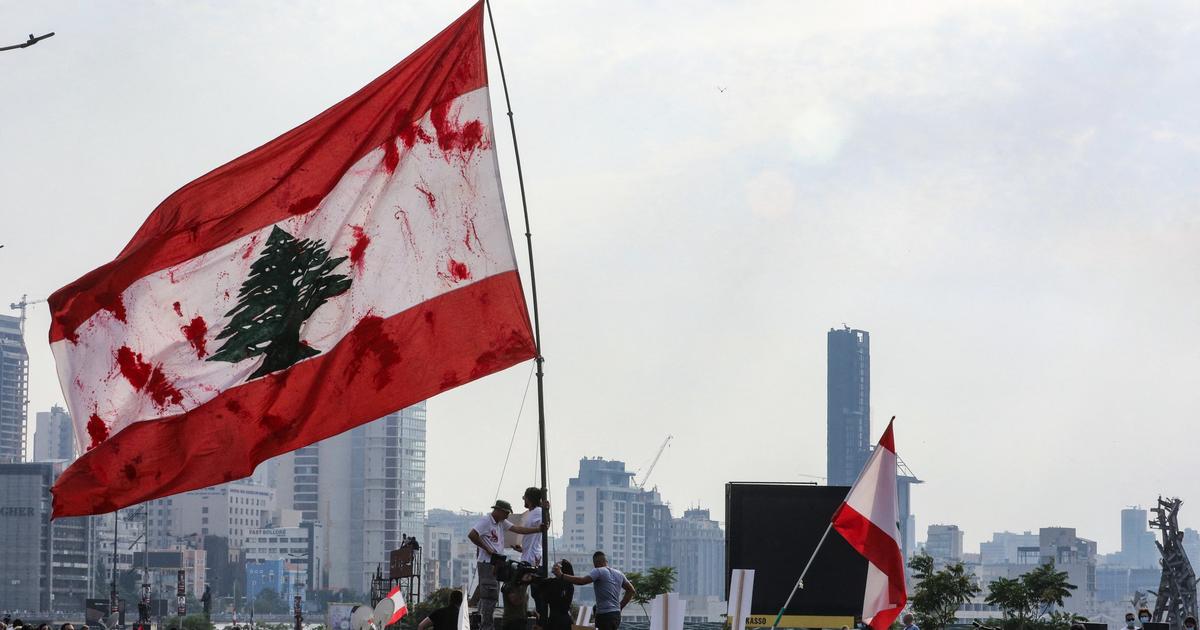Icon: enlarge
Eleven-year-old Syrian refugee Wael searches for recyclable waste such as plastic, paper and cans in a garbage container in Beirut
Photo: Maria Klenner / DER SPIEGEL
Wael was nine years old when he first rummaged through the trash to support his family.
Today, two years later, he has become routine in collecting waste.
If his arms are too short to reach the bags, he rests his hips on the edge of the container and tilts his front body forward.
It then looks like Wael is diving into the trash.
The eleven-year-old is still a little boy, four feet tall, but his childhood is long gone.
Five years ago his father Hussein brought the family to Lebanon.
At that time there was war in their village in the desert of Eastern Syria.
The "Islamic State" (IS) controlled the area, the international anti-IS coalition and the Assad regime dropped bombs.
"Our house was hit too," says Wael, looking into space with his large, dark brown eyes.
Icon: enlarge
Searching for rubbish to survive: the Syrian refugees Wael, Saleh, Suleiman and Mohammed (from left to right) in an unused area in downtown Beirut
Photo: Maria Klenner / DER SPIEGEL
There is still no peace in Syria, and in Lebanon the economy first collapsed, then came the pandemic.
"I used to work in the port or on a construction site," says Hussein Hassoud, "but these jobs no longer exist." The 50-year-old has six children.
His wife, three daughters and the baby live in a tent camp on the Bekaa plain. Wael and his 18-year-old brother Alaa help their father in Beirut to collect glass, scrap metal and cans, which they then sell to traders in their neighborhood.
"We have once again greatly increased the aid payments to Syrian refugees in recent months, but it is still far too little," says Lisa Abou Khaled from the United Nations Refugee Agency (UNHCR) about the economic crisis that has now been going on for a year and a half. in which the Lebanese currency has lost more than 80 percent of its value.
As a result, around 90 percent of the more than one million Syrian refugees in the country now live in extreme poverty.
Icon: enlarge
In the early morning Wael sits on the threshold of his bedroom, which he shares with his father (center) and other refugees, and puts on his shoes
Photo: Maria Klenner / DER SPIEGEL
»There was child labor in Lebanon long before the pandemic, the explosion in Beirut and the worsening economic crisis.
But now we are realizing that more and more children have to work more and longer in increasingly poor conditions, «says Abou Khaled from UNHCR.
Their housing is also usually devastating.
Together with his father, brother and five other young men from Syria, Wael lives in a room in a house that has no windows or doors.
The building in the Basta district of Beirut has been abandoned since the civil war, a tree grows out of the facade, water drips from the ceiling, and there is no shower for the more than one hundred Syrian tenants.
Wael's day starts at seven in the morning.
His once sky-blue jacket is black and gray with dirt, and he slips into his Nike sneakers without socks.
It rained during the night.
The eleven-year-old set off, routinely looks into the containers, grabs the bags on top, empties them and collects what they can sell.
He has just found three old perfume bottles, for which the dealers pay extra because the bottles can be refilled.
In the evening the boys meet in a wasteland to sort the rest.
They separate the transparent from the matt, thicker plastic, in the case of scrap metal, copper cables, parts of motors and aluminum containers.
"In the past we sometimes earned 50,000 lira a day," says 21-year-old Hamed, "now in lockdown it's not even half." According to the latest exchange rate, around three dollars for ten hours rummaging in the dirt, completely defenseless.
Wael's father shrugs his shoulders: "We can't afford new masks and gloves every day."
Icon: enlarge
Around three dollars for ten hours rummaging in the dirt: Wael has found an unopened toy box
Photo: Maria Klenner / DER SPIEGEL
The informal garbage business is booming in Beirut because certain recyclables are sold abroad and hard currency is paid for them.
A Syrian man who transports rubbish himself reports: “The business is divided into districts and working classes: The lowest group is made up of children and young people, then there are those who collect the rubbish from them with carts and finally the owners of the collection points. “In the end, all recyclables end up in a central press, the owners of which come from the Dahiyye, the southern suburbs where the Shiite militias Hezbollah and Amal rule.
The informal waste business does little to change the structural waste problem in the country.
The masses in Beirut had already risen in 2015 because the city was literally in danger of suffocating from its rubbish.
Notorious for their corruption and nepotism, the politicians had neglected for years to organize a replacement for a long-overcrowded landfill.
Over several hot summer weeks, the stinking rubbish piled up on the streets of the capital.
Icon: enlarge
Wael is still a child, sometimes he almost has to disappear into the dumpster to rummage through the garbage
Photo: Maria Klenner / DER SPIEGEL
"I was visiting from Mozambique at the time," says Georges Bitar, 33, who had worked as a private banker in Africa.
Shocked by the conditions in his home country, he wanted to start recycling, but couldn't find a supplier.
“That's why I quickly organized a pick-up service through Uber, which ran for three weeks.
Then we developed the app. "
Live Love Recycle was created in cooperation with another NGO.
The principle is simple: users of the app can have recycling bags collected from them, free of charge, as many and as often as they want.
"Around 35,000 people now use our app, and the volume of recycled materials is growing by twelve percent a month," says Bitar.
Icon: enlarge
Georges Bitar, social entrepreneur and founder of Live Love Recycle, in the new main warehouse of his company next to stacks of pressed recyclable materials such as plastic and metal
Photo: Maria Klenner / DER SPIEGEL
In 2018, his organization received a loan from the German Development Ministry, which allowed him to employ 36 refugees, among other things.
The central collection point of Live Love Recycle has now moved to the Beirut suburb of Mansouriyye.
Trucks bring the bags from several stations in the city and the surrounding area to the 2,000 square meter underground car park for sorting and pressing.
The recycling blocks are then sold to Lebanese recycling companies.
But despite all the success, says Georges Bitar, there could be much more: “We have collected a total of 3,000 tonnes since 2018, which is just half the amount of waste that is generated every day in Lebanon.
The potential is enormous. ”And 90 percent of the garbage would still end up in the sea, he explains about the landfills that have been created directly on the coast since the 1990s, polluting the waters there and making fishing increasingly difficult, for example.
Icon: enlarge
In the new main warehouse of the Lebanese recycling company Live Love Recycle, workers are emptying garbage bags full of plastic, paper and metal
Photo: Maria Klenner / DER SPIEGEL
In a semi-regulated recycling industry, on the other hand, many new jobs could quickly be created in the cedar state, also and especially for people who have fled from Syria.
Bachar Zarkan has been employed by Live Love Recycle for two weeks.
With his own moped, over which he has stretched a rain cover, he brings the sacks of the app users to the collection points in east Beirut.
He gets around $ 130 a month for this, a comparatively good salary in times of inflation.
Icon: enlarge
Bachar Zarkan now earns 130 dollars a month, a comparatively good salary in these times in Lebanon
Photo: Maria Klenner / DER SPIEGEL
"Before that, I sat at home for a year and a half," says Zarkan, who fled Damascus in 2016 at the age of 16.
He has tried everywhere, but there were simply no more jobs in Beirut.
"In the end," says Bachar Zarkan, "I would have had no choice but to rummage through the garbage."
Icon: The mirror
This contribution is part of the Global Society project
What is the Global Society project? Up arrow Down arrow
Under the title Global Society, reporters from
Asia, Africa, Latin America and Europe
report on injustices in a globalized world, socio-political challenges and sustainable development.
The reports, analyzes, photo series, videos and podcasts appear in the international section of SPIEGEL.
The project is long-term and will be supported by the Bill & Melinda Gates Foundation (BMGF) for three years.
A detailed FAQ with questions and answers about the project can be found here.
What does the funding look like in concrete terms? Up arrow Down arrow
The Bill & Melinda Gates Foundation (BMGF) is supporting the project for three years with a total of around 2.3 million euros.
Is the journalistic content independent of the foundation? Up arrow Down arrow
Yes.
The editorial content is created without the influence of the Gates Foundation.
Do other media have similar projects? Up arrow Down arrow
Yes.
Big European media like "The Guardian" and "El País" have set up similar sections on their news sites with "Global Development" and "Planeta Futuro" with the support of the Gates Foundation.
Have there already been similar projects at SPIEGEL? Up arrow Down arrow
In recent years, SPIEGEL has already implemented two projects with the European Journalism Center (EJC) and the support of the Bill & Melinda Gates Foundation: The "Expedition The Day After Tomorrow" on global sustainability goals and the journalistic refugee project "The New Arrivals", as part of this several award-winning multimedia reports on the topics of migration and flight have been produced.
Where can I find all publications on Global Society? Up arrow Down arrow
The pieces can be found at SPIEGEL on the topic Global Society.









/cloudfront-eu-central-1.images.arcpublishing.com/prisa/LBNNIBY325CABA2HAMMUUBWQRI.JPG)





